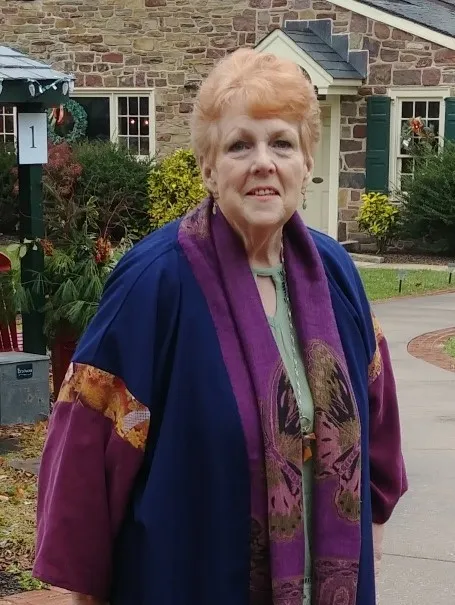
Romance scammers are prowling this Valentine's Day. How to protect yourself.
Kate Kleinert wasn't looking for romance. But something about the handsome man in medical scrubs pulled on her heart strings. The widow accepted the Facebook friend request from "Tony," who said he was a surgeon working for the United Nations in Iraq.
Tony was quick to profess his love, but took months building up his story and getting his two pre-teen children who were in boarding school to e-mail Kleinert, 71, and ask if they could call her "mom."
By the time the daughter was sick from COVID-19 during the 2020 lockdown and needed money, Kleinert was emotionally invested in the young girl, her brother and her father.
Over the course of the next four months, the Manheim, Pennsylvania woman would drain her savings and retirement funds to send Tony and his kids $39,000 in gift cards and cryptocurrency.
She was heartbroken when she finally realized that it was all a con and followed the patterns of other romance scammers looking to take advantage of vulnerable singles looking for love ultimately draining their finances.
Need a break? Play the USA TODAY Daily Crossword Puzzle.

Romance scammers target people looking for love
As Valentine's Day – the day to celebrate love – approaches, Kleinert and consumer advocates are sounding the alarm to warn others about romance scams.
Romance scams are designed to establish a relationship with someone – often based on what that person has shared on social media or on a dating site – to develop trust and eventually exploit that person for financial gain. The scammer eventually gets their target to send money by saying they or a family member need financial help, or by offering a lucrative investment opportunity.
In 2023, the Federal Trade Commission reported losses to romance scams topped $1.14 billion among 64,003 victims. Full 2024 numbers have not yet been released, but for the first nine months of 2024, there were 42,399 victims who reported a cumulative loss of $823 million, an FTC spokesman said.
Those numbers are likely vastly underreported, said Erin West, who retired after 26 years as deputy district attorney in Santa Clara County, California, including eight years prosecuting high-tech crime. Not all victims will report that they've been scammed, often because they're embarrassed, she said.

West's Operation Shamrock educates the public, law enforcement and banking officials on the dangers of pig-butchering scams. That refers to a type of scam, including romance schemes, where multi-national crime rings target victims to "fatten them up" (build trust) and then uses sophisticated methods "to take every penny the victim has," West said.
While some victims are able to recover some of their monetary losses, most don't get their money back. Often the scammer asks to be paid in cryptocurrency, which is even harder to recoup, West said.
Unfortunately, West said, Most people who are lured into a romance scam or other similar scam are "under a spell that has been cast over them by using really sophisticated psychological tricks, so it's very difficult once you're in this to understand you're in this."

Romances scam story starts to crumble
That's what happened to Kleinert. Her scammer asked for small amounts of money that eventually grew larger. It started with his sick child, then he needed money for a better wifi signal to talk to Kleinert. Eventually, he needed money to fly to Philadelphia to be with her.
Even when Tony didn't show up in Philadelphia, and an attorney called Kleinert to say he'd been detained and needed $20,000 for bail, she was still too infatuated to recognize she was being conned, she told USA TODAY.
Kleinert had emptied her savings account, her 401(k) and her late husband's life insurance policy.
She started to realize something was wrong when she was told she could not visit Tony and that he would be transferred to a facility in Oklahoma. He also called begging her for money.
She eventually cut him off and had to seek financial help from her sisters, who quickly offered their support.
AI makes scamming easier – and it's going to get worse
Kleinert is not alone. The sophistication of scammers is growing and it will get worse.
"We live in an age of AI powered fraud and scamming, so it's the sad reality," said Anusha Parisutham, senior director of platform and AI at Feedzai, a company that helps financial institutions combat fraud.
While there are sophisticated human crime rings, AI is also increasingly being used to automate the schemes and lure more potential victims, said Parisutham.
AI is used to personalize messages after bots have scanned social media sites to gather information on the potential victim. Then AI can be used to reach out to multiple people in an automated manner, she said.
AI can also be used to clone or alter photos and voices to appear real when they aren't, said Parisutham.
But though the technology is getting more sophisticated and intuitive, Parisutham also believes that security and defensive moves to thwart scammers will improve, too, "so it's a continuous game of chess."
Romance scams:A widow opened herself up to new love. Instead, she was catfished for a million dollars.
Dating apps try to thwart bad actors as they join
Match Group, which owns more than 20 dating app platforms including Match.com, Tinder, Hinge, OK Cupid and Plenty of Fish, uses a wide range of technology to proactively detect scams, said Yoel Roth, vice president of trust and safety for the Match Group.
"We use advanced AI and automation to try to catch bad actors as they're registering," Roth told USA TODAY. If the bad actors get through the first screening, once they are active, more than 90% of "content moderation" actions that are taken happen automatically without a user needing to report scam activity, he said.
The company has also built coalitions and launched the Tech Against Scams Coalition to bring together members of dating apps, social media operators and financial services and cryptocurrency companies to work together to combat scams and share practices that work, Roth said.
The Match dating apps also run scam awareness campaigns to encourage people to keep their communication within the dating app for protection. Often, scammers will suggest the conversation get moved to another communication method, which can't be tracked, Roth said.
And Match Group is also working to develop educational materials to help users recognize AI-generated images, such as deep fakes, to protect its users, though currently an independent analysis for Tinder showed AI-generated or manipulated content was only a small fraction of content, Roth said.
Victim wants to help others
Kleinert shares her romance scam story as much as she can, speaking to consumer groups and trying to warn others.
"I would like to stop someone else from falling for the same thing," she said. "It's devastating."
Tips to protect yourself from a romance scam
- Does the person's story elicit emotions of sympathy? Often, once the scammer has hooked the victim into being emotionally attached, then the stories looking for sympathy (and financial help) come out, said Parisutham.
- Person can't meet up? That's a red flag: Often scammers are not local and potentially not in the same country. So once questions of meeting up or getting on a video call are thwarted, that could be a sign, said Parisutham.
- Have a trusted circle of friends and family: People close to you can look at the relationship and situation from an objective lens instead of an emotional one to see if there are warning signs, said Parisutham.
- If you have been scammed out of money, be careful of "recovery scams." There's a secondary market of scammers who will try to help victims "recover" lost money. They get scammed a second time, said West.
- Find resources: The Better Business Bureau has a Scam Survivor Tool Kit that provides resources for scam victims.
- For more tips: Visa released some red flags and green flags for romance scams, including if something sounds too good to be true or someone is professing love too soon.
Betty Lin-Fisher is a consumer reporter for USA TODAY. Reach her at [email protected] or follow her on X, Facebook or Instagram @blinfisher. Sign up for our free The Daily Money newsletter, which will include consumer news on Fridays, here.

